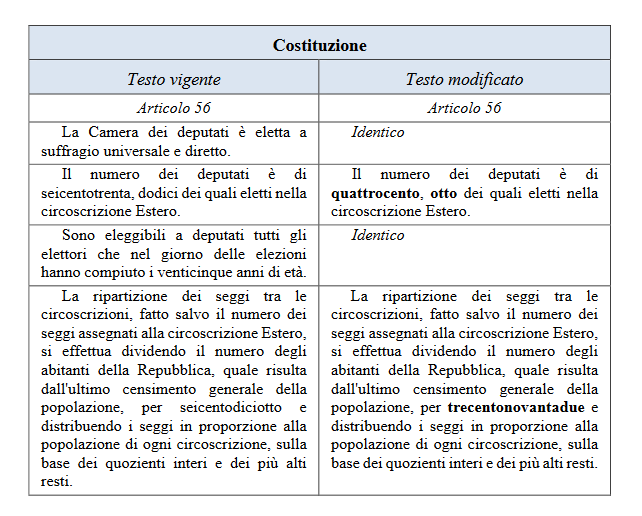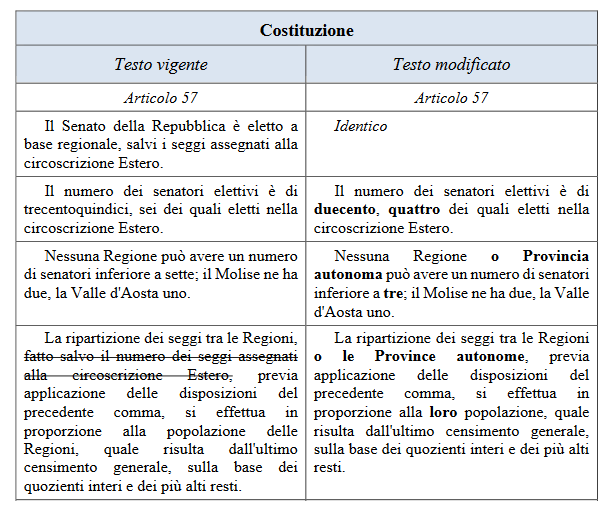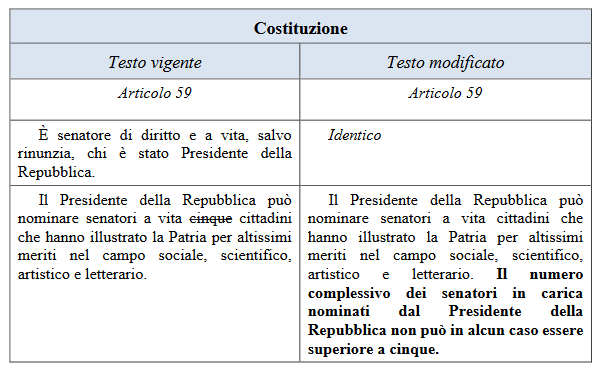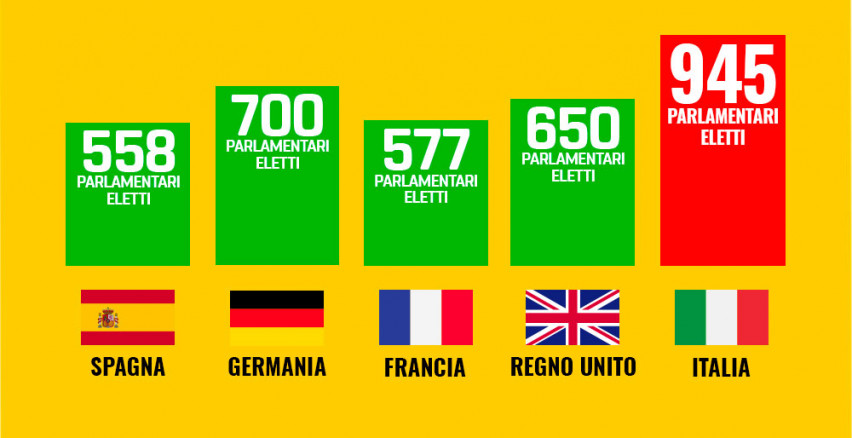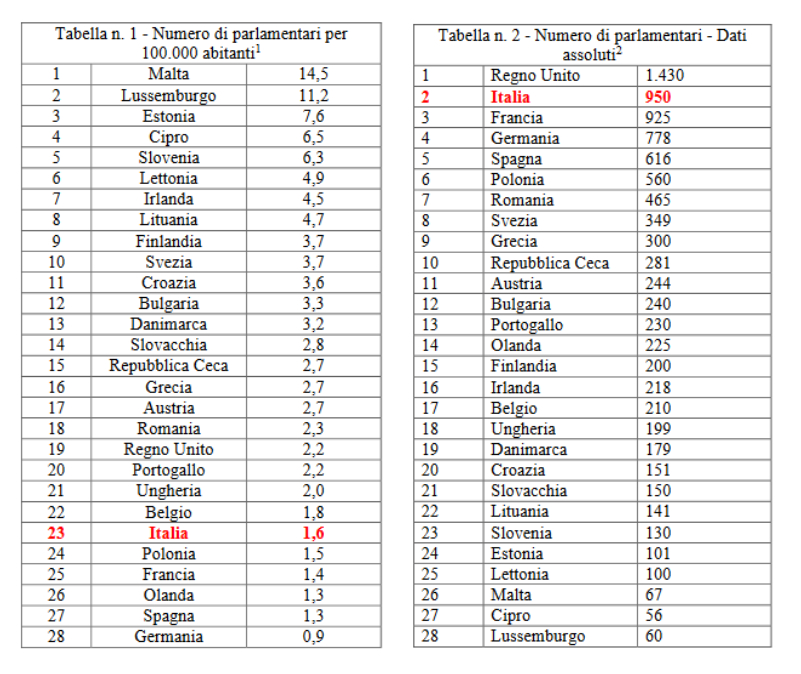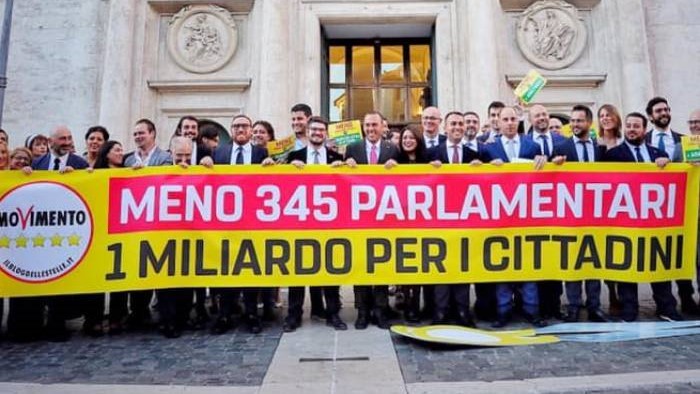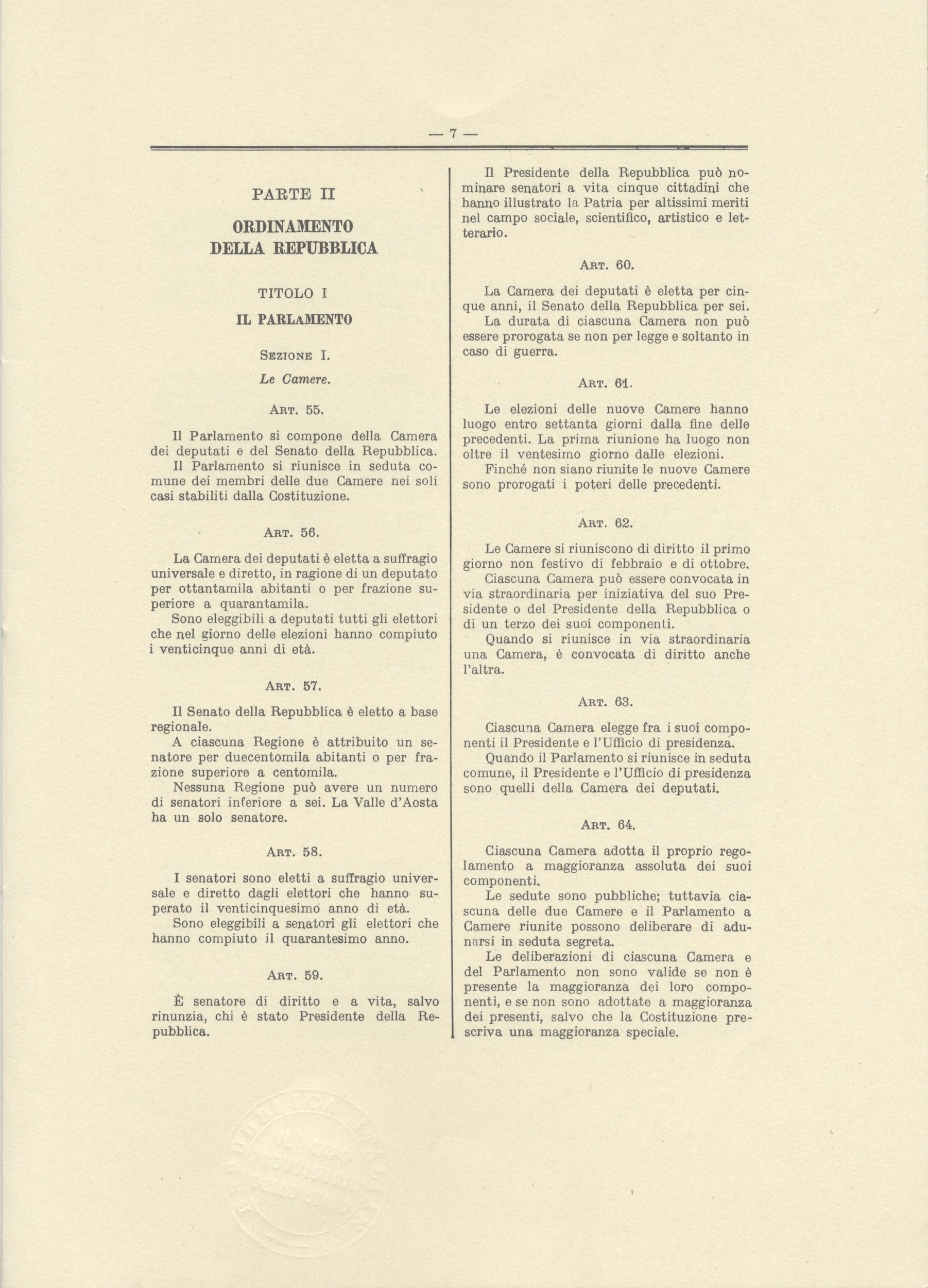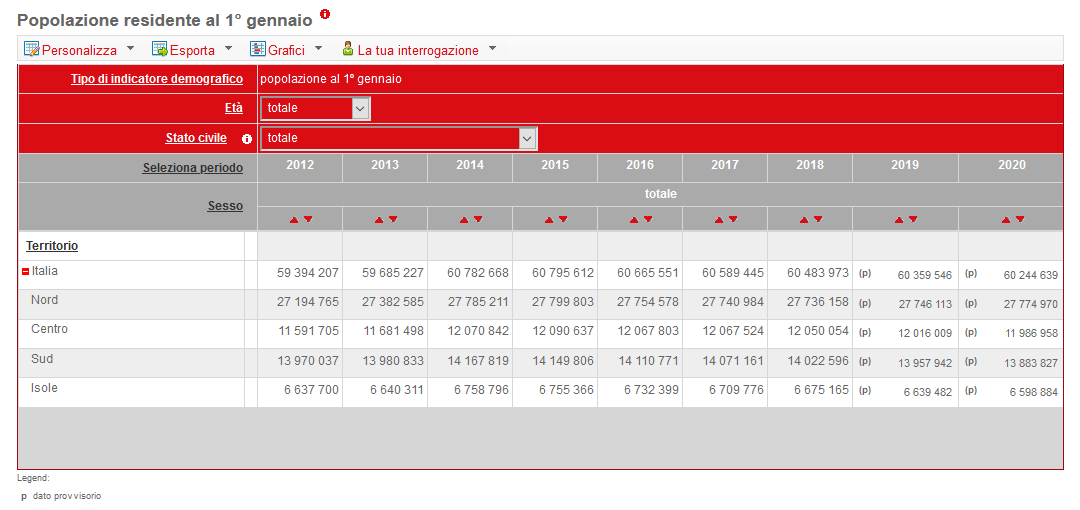Constitutional referendum: 10 reasons to reject the parliamentary cut

It was supposed to take place at the end of March, but due to the covid-19 emergency the referendum has been moved to 20-21 September 2020 .
This is a confirmatory referedum , citizens are called upon to decide whether or not to approve the constitutional reform on the reduction of the number of parliamentarians, inherent in Articles 56, 57 and 59 of the Charter.
The reform provides for the reduction of deputies from 615 to 400 and elected senators from 315 to 200, so from a total of 945 elected parliamentarians it would drop to 600 . There can be a maximum of five senators for life.
Now a comparison between the current text and the modified one.
The subject was covered in depth in this article earlier this year, but it's worth a quick review.
# 1 – WITH THE CUT THE REPRESENTATION WORSE
According to supporters of the "Yes" in the referendum, Italy's problem is that it has too many elected parliamentarians from other countries in Europe.
Here the first alarm bell rings. If the problem is the number of parliamentarians, what does it matter if they are elected or not?
In fact, the country that has the most parliamentarians in Europe is the United Kingdom (over 1,400), Italy is in second place in absolute values.
However, the most correct method of comparison must take into account representation , ie the proportion between parliamentarians and the number of inhabitants.
As you can see, Italy has only 1.6 parliamentarians for every 100,000 inhabitants and is among the worst in Europe!
With the reform it will drop to 1.0 parliamentarians per 100,000 inhabitants , making it the worst on the continent together with Germany.
# 2 – WITH THE CUT, A SHOT OF THANKS TO MINORITIES
Transition from proportional to majority, abolition of public financing for parties, blocked price lists and high thresholds: this is how, from 1994 to today, representation has been distorted.
With the cut of the parliamentarians we want to complete this plan: if today it takes a minimum of 63,000 voters to elect a parliamentarian, with the cut it will take at least 100,000.
Who earns it? Obviously the big parties that will blinder in this way, making it impossible to replace with new parties.
We recall that the exclusion of minorities in parliament is a characteristic of dictatorships, voting NO in the referendum means having respect for the basic principles of democracy (today already largely compromised).
# 3 – NO REAL SAVINGS FOR CITIZENS
The promoters of the cut declare that the reduction will save one billion every two terms , that is, about 100 million euros per year.
Are they many or few? 100 million euros on a population of 60 million inhabitants means a "saving" of 1.67 € per year for each citizen.
And do you know what 100 million affect the state budget? In 2019, the total public expenditure of our country amounted to 870.7 billion euros .
Let's make a simple proportion: it is like saying that on a salary or pension of € 870 you will save 10 cents , therefore not even alms.
If the problem were costs, a reduction in salaries would be enough (as a mere symbolic gesture).
# 4 – LESS PARLIAMENTARIANS? A FAVOR OF ECONOMIC POWER
In your opinion, for lobbies, banks, multinationals, it is easier to control 945 or 600 MPs?
The average grullino in fact does not get to understand that with "fewer people to bribe" the real savings are for the corrupters .
Those who are convinced that politicians today carry out orders on behalf of third parties, reducing their number will make it easier for these powers to control parliament and pass the laws they want.
The lobbyists will therefore vote YES in the referendum, which side are you on?
# 5 – IN HISTORY, WHO TRIED TO CUT THE PARLIAMENTARIES?
In recent history, who has tried to push through such reforms? Renzi in 2016 and Berlusconi in 2006, so let's talk about parties and individual exponents who have done everything except the national interest.
Furthermore, the cut of the parliamentarians has always been the dream of Licio Gelli (P2 Masonic lodge), put in black and white in the “Democratic Renaissance” plan.
However, the P2 cut provided for a reduction to 700 elected parliamentarians, therefore less severe than the current reform desired by the M5S which would bring them to 600.
Another historical example: in 1921, a year before the march on Rome, the chamber of deputies of the kingdom of Italy had 535 members, in 1929 it was reduced to 400 (the same number of deputies that the m5s would like …)
Voting NO to the referendum means preventing the country's anti-democratic drift, after all the government – with the excuse of the covid – has already suppressed constitutional freedoms …
# 6 – PREVENT ANOTHER SCAMPING AGAINST THE ORIGINAL CONSTITUTION
The original text of the Constitution, in articles 56-57, provided that the number of elected deputies and senators was in proportion to the number of inhabitants.
One deputy for every 80,000 inhabitants (or fraction greater than 40,000) and one senator for every 200,000 inhabitants (or fraction greater than 100,000).
The current number of 630 deputies and 315 elective senators was set by Constitutional Law No. 2 of 1963 .
Why had the constituents made this choice? In order that all minorities could be represented in parliament.
If the original text were still in force, how many would the members of the two chambers be today with a population, as of 1 January 2020, of 60,244,639 inhabitants?
We would need 753 deputies and 301 senators totaling 1054 electives , or over 100 more than we have today.
Yes, because in the last 60 years the Italian population has grown a lot, but few remember it …
# 7 – UNITED STATES AND GERMANY ARE NOT EXAMPLES TO FOLLOW
In addition to the number of inhabitants, when making a comparison with other nations, it is necessary to take into account the form of government , or the distribution of powers among the constitutional bodies (Parliament, Government, head of state)
It often happens that we hear phrases like "eh but look at the fact that the United States and Germany have fewer parliamentarians than us".
The USA , as the name suggests, are 50 federated states that already have their national parliaments (with broad powers) and there is also the direct election of the head of state as a counterweight to the low number of parliamentarians at the central level.
Germany, like the USA, is also a federal model where local authorities, in this case the landers (Bavaria, Baden-Württemberg, etc.) have higher skills than our regions.
Then frankly, even the very idea of considering Germany and the United States as an example of democracy makes us laugh, because we are talking about states under the total control of economic and financial power.
Do you want Italy to become a colony forever?
# 8 – WITH THE CUT WE WILL HAVE AN EVEN MORE POOR POLITICAL CLASS
Many complain about the low productivity or absenteeism of parliamentarians but the cut does not improve the quality of the elected officials in any way , because the party secretariats decide who should enter!
Who will have priority to enter? Probably who will give the most faithful obedience to the party , even if this were to totally betray the electoral mandate: therefore forget the rebel parliamentarians.
Furthermore, with the self-styled "useful vote", the harmful American bipolarism will be consolidated forever, where anyone who governs goes on automatic pilot set to "massacre of the country".
In short, with a “YES” victory in the referendum, a cosmetic democracy is consolidated forever, where those inside only carry out orders from the outside.
# 9 – A VOTE AGAINST ANTI-POLITICS
The people's anger against an unworthy political class is sacrosanct and justified, but the solution is called exchange .
It is not by making it more difficult to access parliament, the cornerstone of our democracy, that the country's situation will improve.
Those who think that reducing parliamentarians is punishing the caste, are actually reducing the space of the people in the institutions.
An elitist, demagogic and subversive reform of the order, which will end up strengthening the much hated caste for the reasons mentioned in the previous point.
# 10 – SENDING THE FAKE REVOLUTIONARIES TO THAT COUNTRY
The party that most of all rode anti-politics is the one that eventually turned into the worst system party.
The 5-star movement has taken citizens' requests for change in order to deactivate them ( gatekeeping ), they will go down in history as the worst traitors of the popular will.
Voting NO in the September referendum also means sending the fuck off party to hell.
ORIGINAL SOURCE  https://canalesovranista.altervista.org/referendum-costituzionale-10-motivi-per-bocciare-il-taglio-dei-parlamentari/
https://canalesovranista.altervista.org/referendum-costituzionale-10-motivi-per-bocciare-il-taglio-dei-parlamentari/

Thanks to our Telegram channel you can stay updated on the publication of new articles of Economic Scenarios.
The article Constitutional Referendum: 10 reasons to reject the parliamentary cut comes from ScenariEconomici.it .
This is a machine translation of a post published on Scenari Economici at the URL https://scenarieconomici.it/referendum-costituzionale-10-motivi-per-bocciare-il-taglio-dei-parlamentari/ on Fri, 04 Sep 2020 12:30:50 +0000.

